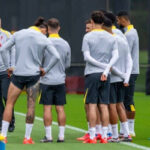Liverpool’s Defensive Crisis: The Jeremie Frimpong Injury and Its Far-Reaching Implications

The opening weeks of the 2025/26 Premier League season have brought unexpected challenges for Liverpool Football Club, as they grapple with a significant injury crisis that threatens to derail their early momentum. The centerpiece of this defensive dilemma is the unfortunate injury to Dutch right-back Jeremie Frimpong, whose hamstring problem has exposed vulnerabilities in Liverpool’s squad depth and tactical flexibility that could have profound implications for their campaign.
The story began during what should have been a triumphant evening for Liverpool. In their Premier League season opener against AFC Bournemouth, the Reds were seeking to establish their credentials under the continued guidance of head coach Arne Slot. The match, played out under the bright lights of Anfield, was meant to showcase Liverpool’s evolution and ambition for the new campaign. However, it quickly became apparent that the evening would be remembered not just for the result, but for a moment that would reshape Liverpool’s immediate future.
Jeremie Frimpong, the dynamic Dutch defender who had impressed during pre-season friendlies and was expected to be a cornerstone of Liverpool’s defensive setup, suddenly pulled up with what appeared to be a muscular injury. The sight of the right-back limping off the field sent immediate shockwaves through the Liverpool faithful, who had witnessed similar scenes all too often in recent seasons. The clinical assessment from the medical team was swift and decisive: Frimpong had suffered a hamstring injury that would sideline him until after the September international break.
The timing of this injury could hardly be worse for Liverpool. With crucial fixtures against Newcastle United and Arsenal looming large on the horizon, both of which will be broadcast live on Sky Sports to millions of viewers worldwide, Liverpool now face the prospect of navigating two of their most challenging early-season tests without one of their key defensive players. The Newcastle fixture, scheduled for Monday Night Football at St. James’ Park, represents a particularly daunting challenge, while the Arsenal clash at Anfield on Sunday, August 31st, could prove pivotal in determining early-season momentum in the title race.
Liverpool head coach Arne Slot found himself facing a complex puzzle that extends far beyond simply finding a replacement player. The Dutch manager, who has been working to implement his tactical vision since taking charge, now must adapt his system to accommodate the absence of a player who was clearly integral to his plans. Speaking to the media, Slot provided insight into both the injury situation and the broader implications for his team selection.
“The medical team was completely right about Jeremie, to tell me I had to take him off because he’s out until the end of the international break,” Slot explained, revealing the professional diligence of Liverpool’s medical staff. The manager’s comments suggest that the decision to substitute Frimpong was made as a precautionary measure, potentially preventing a more serious injury that could have kept the defender out for an even longer period. This proactive approach, while initially criticized by some observers, demonstrates the sophisticated injury management protocols that modern football clubs must employ to protect their valuable assets.
The challenge for Slot extends beyond the immediate personnel issue. Liverpool’s tactical approach under his guidance relies heavily on the attacking contributions of their full-backs, with the right-back position being particularly crucial to their overall strategy. Frimpong’s injury therefore represents not just the loss of a defender, but the disruption of an entire tactical framework that has been carefully constructed during pre-season preparations
What makes Liverpool’s current predicament particularly challenging is the simultaneous absence of multiple players who could naturally fill the right-back position. Conor Bradley, who would typically be the first-choice replacement for Frimpong, is himself recovering from a hamstring injury that curtailed his involvement in Liverpool’s pre-season tour of the Far East. While Bradley returned to training with the first team on Thursday, his limited involvement raises questions about his readiness to handle the physical and mental demands of Premier League football at its highest level.
The situation is further complicated by the fitness concerns surrounding Joe Gomez, another experienced defender who possesses the versatility to operate at right-back. Gomez, who has been a stalwart of Liverpool’s defensive options over many seasons, is returning from an Achilles injury that also disrupted his pre-season preparations. Although he managed to feature for the final 18 minutes against Bournemouth, Slot’s comments suggest that the defender may not yet be ready for a starting role in such demanding fixtures.
Joe Gomez is definitely one of them,” Slot acknowledged when discussing his right-back options. “But for him to already play 20 minutes, that was already quite a lot. I wouldn’t say he had a setback but he wasn’t able to train three days in a row completely with the team. It’s completely normal if you’ve been out for so long and all of a sudden the manager needs you for 20 minutes.” These comments reveal the delicate balance that modern football clubs must strike between utilizing available players and managing their long-term fitness and availability.
Faced with limited conventional options, Slot has been forced to consider more creative solutions to his defensive conundrum. The manager has identified several midfield players who could potentially be deployed in an unfamiliar right-back role, demonstrating the tactical flexibility that modern football increasingly demands. Wataru Endo, the Japanese midfielder who briefly filled in at right-back during the Bournemouth match, represents one such option. His defensive instincts and work rate could provide a solid foundation, even if his attacking contributions might be more limited than those of a natural full-back.
Dominik Szoboszlai presents another intriguing possibility. The Hungarian midfielder’s technical ability and pace could translate well to a full-back role, particularly in Liverpool’s system where the wide defenders are expected to contribute significantly in attacking phases. Szoboszlai’s experience playing in various positions throughout his career suggests he could adapt to the defensive responsibilities while maintaining the attacking threat that is so crucial to Liverpool’s tactical approach.
Perhaps the most interesting option is Curtis Jones, who has previous experience playing at right-back for both Liverpool and England. Jones demonstrated his versatility during similar injury crises last season, featuring in the position against Everton and Fulham. His familiarity with the role, combined with his understanding of Liverpool’s tactical systems, makes him a potentially attractive option for Slot. The fact that England manager Thomas Tuchel has also utilized Jones in this position suggests that the young midfielder possesses the attributes necessary to excel as a makeshift full-back at the highest level.
The injury crisis has attracted significant attention from football analysts and former players, who have been quick to identify potential vulnerabilities in Liverpool’s setup. Sky Sports pundit Paul Merson has been particularly vocal about his concerns regarding Liverpool’s defensive stability down the right flank. His analysis provides valuable insight into the tactical implications of Frimpong’s absence and the broader challenges facing Liverpool’s defensive structure.
“You worry for those two games coming up,” Merson observed, highlighting the specific challenges posed by Newcastle and Arsenal. “The way they play, they let [Mohamed] Salah stay up top and he doesn’t have to be tracking back. And now with Harvey Barnes probably playing out on that wing for Newcastle, then either Eberechi Eze or Gabriel Martinelli playing there the week after, they will have to get through those next two games.”
Merson’s analysis touches on a fundamental aspect of Liverpool’s tactical approach under Slot. The system relies heavily on allowing attacking players like Mohamed Salah to focus primarily on their offensive contributions, with the full-backs providing the width and defensive stability that allows such tactical freedom. The absence of a natural right-back therefore creates a potential weakness that opposition teams will inevitably seek to exploit.
The former Arsenal midfielder’s concerns about Liverpool’s defensive vulnerability were further emphasized by his recollections of the Community Shield. “I was at the Community Shield the week before and I was worried about Liverpool defensively,” he noted. “Frimpong likes bombing forward and Salah is staying up the pitch. There’s always going to be space down their right and the opposition’s left. I worry for Liverpool down there.” This analysis suggests that even when fully fit, Liverpool’s tactical approach creates inherent risks that could be magnified by the current injury situation.
While the injury crisis has created significant challenges for Liverpool, there is at least one positive development that could help mitigate some of the defensive concerns. The return of midfielder Ryan Gravenberch from suspension provides Slot with an additional tactical option that could prove crucial in maintaining defensive stability. Gravenberch, who was suspended for the season opener following a red card on the final day of the previous campaign, brings qualities that could be particularly valuable given Liverpool’s current predicament.
Slot’s comments about Gravenberch’s potential impact reveal the tactical thinking behind Liverpool’s approach to defensive balance. “If you look at the second goal we conceded [against Bournemouth] they could go from one side to the other side without being attacked,” the manager explained. “If you look back at last season, every single time Ryan played, he would have been in that position. For him not being there and us playing with very good players but very attacking-minded players, that for example hurt us in that goal.”
This analysis highlights the crucial role that Gravenberch plays in Liverpool’s defensive structure. Rather than simply being another midfielder, he serves as a defensive screen that allows Liverpool’s more attacking players to focus on their offensive responsibilities. His presence could therefore help compensate for some of the defensive vulnerabilities created by playing makeshift full-backs or players who are not yet fully match-fit.
Liverpool’s current injury crisis raises broader questions about squad management and the balance between maintaining a competitive squad and managing resources efficiently. Slot’s comments about squad composition provide insight into the philosophical approach that modern football clubs must adopt. “You cannot prepare for two injuries in one position,” he noted pragmatically. “It would be stupid for us to have three full-backs or five left-backs – although we have three left-backs!”
This observation highlights one of the fundamental challenges facing football clubs in the modern era. While supporters often call for greater squad depth, the financial and practical realities of maintaining large squads make it impossible to prepare for every possible scenario. Liverpool’s situation demonstrates how quickly a seemingly well-prepared squad can find itself stretched thin by a combination of unfortunate injuries and timing.
The reference to having three left-backs while facing a shortage at right-back also illustrates the unpredictable nature of injury patterns. Despite careful planning and analysis, football clubs cannot anticipate every possible combination of injuries and must instead rely on tactical flexibility and player adaptability to navigate such challenges.
The injury crisis has not gone unnoticed by Liverpool’s upcoming opponents, who will undoubtedly be analyzing potential weaknesses to exploit. Newcastle United, managed by Eddie Howe, are particularly well-equipped to take advantage of defensive vulnerabilities down Liverpool’s right flank. The presence of Harvey Barnes on Newcastle’s left wing creates a direct threat that Liverpool’s makeshift right-back will need to contain.
Barnes’s pace and directness represent exactly the type of attacking threat that could expose an unfamiliar or not-fully-fit defender. His ability to stretch defenses and create opportunities for teammates means that Liverpool’s defensive setup will face an immediate test of its resilience and adaptability. The St. James’ Park atmosphere will only add to the intensity of this challenge, creating an environment where any defensive uncertainty could be ruthlessly exploited.
Arsenal, meanwhile, present their own unique challenges. Whether fielding Gabriel Martinelli or another attacking threat down their right flank, the Gunners possess the technical ability and tactical sophistication to identify and exploit defensive weaknesses. The fixture at Anfield, while providing the advantage of home support, will require Liverpool to demonstrate that they can maintain their defensive solidity despite the ongoing personnel challenges
Beyond the immediate tactical challenges, Frimpong’s injury raises questions about Liverpool’s ability to maintain consistency throughout a demanding campaign. The modern football calendar, with its relentless schedule of domestic and European competitions, requires clubs to have both depth and adaptability. Liverpool’s current situation tests both of these attributes in the early stages of the season.
The injury also highlights the interconnected nature of modern football squads. The absence of one player can have cascading effects throughout the team, requiring tactical adjustments that may impact performance in multiple areas. Liverpool’s ability to navigate this challenge successfully could therefore serve as an early indicator of their prospects for the season as a whole.q1
Furthermore, the situation provides an opportunity for Liverpool to demonstrate the strength of their squad culture and the effectiveness of their coaching methods. Successfully integrating makeshift solutions and maintaining performance levels despite significant disruption would represent a notable achievement that could build confidence and resilience for future challenges.
The timeline for Frimpong’s return provides both challenges and opportunities for Liverpool. His expected absence until after the September international break means that Liverpool will need to navigate not just the immediate Newcastle and Arsenal fixtures, but potentially several additional matches depending on how the international schedule aligns with the Premier League calendar.
The international break itself could prove beneficial for Liverpool’s injury recovery efforts. The additional time available for rehabilitation and fitness work could ensure that both Frimpong and other injured players return in optimal condition. However, it also means that Liverpool must manage their immediate challenges without the prospect of imminent reinforcements.
The situation also raises questions about potential transfer market activity. While the summer transfer window may be closing, Liverpool’s management team will undoubtedly be assessing whether additional defensive reinforcement is necessary to ensure adequate squad depth throughout the season. The balance between short-term solutions and long-term planning will be crucial in determining their approach.
Liverpool’s injury crisis, centered around Jeremie Frimpong’s hamstring problem, represents far more than a simple personnel challenge. It serves as an early-season test of the club’s character, tactical flexibility, and squad depth. The upcoming fixtures against Newcastle and Arsenal will provide a definitive indication of how well Liverpool can adapt to adversity and maintain their competitive standards despite significant disruption.
The situation also highlights the complex challenges facing modern football clubs in managing squad resources and maintaining performance levels throughout demanding campaigns. Liverpool’s response to this crisis could therefore serve as a case study in effective crisis management and tactical adaptation.
Ultimately, while Frimpong’s injury represents a significant setback, it also provides an opportunity for Liverpool to demonstrate their resilience and depth. The club’s ability to navigate these challenges successfully could prove to be a defining moment in their season, potentially building the kind of character and unity that proves crucial in determining ultimate success or failure.
As Liverpool prepare for their upcoming challenges, all eyes will be on Arne Slot’s tactical solutions and the players who step up to fill the void. The beautiful game has always been defined by such moments of adversity and adaptation, and Liverpool’s response to their current crisis will undoubtedly add another compelling chapter to their ongoing story.















